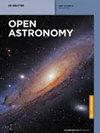A numerical approach to model chemistry of complex organic molecules in a protoplanetary disk
IF 0.5
4区 物理与天体物理
Q4 ASTRONOMY & ASTROPHYSICS
引用次数: 0
Abstract
Abstract Multiphase astrochemical modeling presents a numerical challenge especially for the simulation of objects with the wide range of physical parameters such as protoplanetary disks. We demonstrate an implementation of the analytical Jacobian for the numerical integration of the system of differential rate equations that govern chemical evolution in star-forming regions. The analytical Jacobian allowed us to greatly improve the stability of the code in protoplanetary disk conditions. We utilize the MONACO code to study the evolution of abundances of chemical species in protoplanetary disks. The chemical model includes 670 species and 6,015 reactions in the gas phase and on interstellar grains. The specific feature of the utilized chemical model is the inclusion of low-temperature chemical processes leading to the formation of complex organic molecules (COMs), included previously in the models of chemistry of COMs in prestellar clouds. To test the impact of analytical Jacobian on the stability of numerical simulations of chemical evolution in protoplanetary disks, we calculated the chemical composition of the disk using a two-phase model and four variants of the chemical reaction network, three values of the surface diffusion rates, and two types of the initial chemical composition. We also show a preliminary implementation of the analytical Jacobian to a three-phase model.一种模拟原行星盘中复杂有机分子化学的数值方法
多相天体化学建模是一项数值挑战,特别是对于具有大范围物理参数的天体(如原行星盘)的模拟。我们演示了用于控制恒星形成区域化学演化的微分速率方程系统的数值积分的解析雅可比矩阵的实现。解析雅可比矩阵使我们能够大大提高代码在原行星盘条件下的稳定性。我们利用摩纳哥代码来研究原行星盘中化学物质丰度的演化。化学模型包括670种物质和6015种气相和星际颗粒上的反应。所使用的化学模型的具体特点是包含了导致复杂有机分子(COMs)形成的低温化学过程,这些过程包括在恒星前云的COMs化学模型中。为了检验解析雅可比矩阵对原行星盘中化学演化数值模拟稳定性的影响,我们采用两相模型、四种化学反应网络变量、三种表面扩散速率值和两种初始化学组成类型计算了原行星盘中的化学组成。我们还展示了对三相模型的解析雅可比矩阵的初步实现。
本文章由计算机程序翻译,如有差异,请以英文原文为准。
求助全文
约1分钟内获得全文
求助全文
来源期刊

Open Astronomy
Physics and Astronomy-Astronomy and Astrophysics
CiteScore
1.30
自引率
14.30%
发文量
37
审稿时长
16 weeks
期刊介绍:
The journal disseminates research in both observational and theoretical astronomy, astrophysics, solar physics, cosmology, galactic and extragalactic astronomy, high energy particles physics, planetary science, space science and astronomy-related astrobiology, presenting as well the surveys dedicated to astronomical history and education.
 求助内容:
求助内容: 应助结果提醒方式:
应助结果提醒方式:


